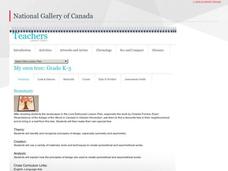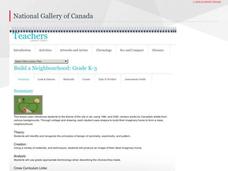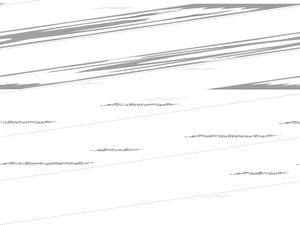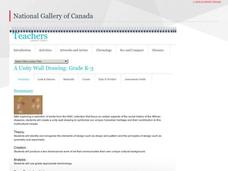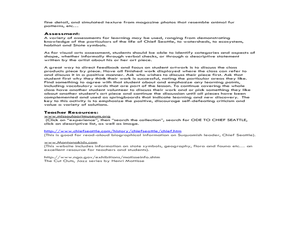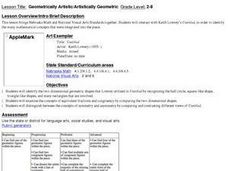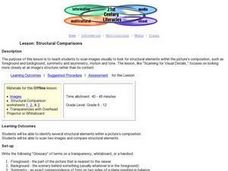National Gallery of Canada
My Own Tree
Nature contains both symmetry and asymmetry. Have your young artists examine symmetry and asymmetry in their own surroundings. After viewing works of art, pupils find trees in their neighborhoods and determine if they are symmetrical or...
National Gallery of Canada
My Own Blanket
Invite your young artists to design blankets that express their own identities. Learners examine various pieces of art before brainstorming a few things that represent their identities. They use these ideas, in addition to symmetry and...
Incredible Art Department
Notan Collages - "Expanding the Square"
Notan is a Japanese word that expresses the interaction between light and dark. Learners explore Notan while creating dimensional art pieces that examine positive and negative spaces. They'll discuss the art of Notan, create their...
National Gallery of Canada
Build a Neighbourhood
What's special about your neighborhood? Build one with your class to find out. Individuals create their dream homes that, when completed, will be placed together around a green space in order to create a neighborhood. Learners also...
Curated OER
Minimal Animals
Have fun creating imaginary creatures with this symmetry lesson plan! Your class will paint one half of their imaginary creature, fold their paper in half, which will result in a symmetrical figure. What a great art project to combine...
National Gallery of Canada
A Unity Wall Drawing
Build class community with an art project. Learners first examine and discuss works of art. They then contribute to a class mural by tracing their hands and decorating them in relation to their own cultures. The final mural incorporates...
Hawaiʻi State Department of Education
Mixed Media Collage
Rhythm, repetition, positive, and negative space is used to create mixed media collages. Let your learners go wild with glue, magazine clippings, and the elements of design. They'll experiment with various types of media, color, and...
Hawaiʻi State Department of Education
Mask Symmetry
When you engage learners in creating symmetrical objects you are also building their vocabulary and math sense. Kids discuss key words such as, asymmetrical, symmetrical, balance, tint, and shade. They use these elements of design to...
National Gallery of Canada
Social Realism
Examine social strife in art. Class members first observe some pieces, and then find an image to inspire their own art. They outline the picture, analyze the composition, make alterations, and color their work.
Curated OER
Composition Compositions
Students explore composition and symmetry to create their own digital media piece. In this design composition lesson, students visit the online websites and examples of asymmetrical compositions and symmetry. Students sketch a...
Curated OER
Cut Outs: Shapes and Symbols
Students create collages based on Juan Quick-to-See Smith's "Ode to Chief Seattle." In this shapes, symbols and Native American lesson, students examine the "Ode to Chief Seattle" and Henri Matisse's cutout work. Students design their...
Curated OER
Monoprint
Students review Gerald Ferstman's work and discuss abstract art. They design and create monoprints on Mylar. They reflect on their work and write about the experience of creating the piece.
Curated OER
Fujiyama
Students examine and discuss Mt. Fuji (Fujiyama) and its effect on the culture and philosophy of Japan. This high school lesson is ideal for a Social Studies, Humanities, or Asian Studies class.
Curated OER
Geometrically Artistic/Artistically Geomtric
Students identify the two-dimensional geometric shapes Lowrey utilized in the painting Untitled. Students compare the two-dimensional shapes in terms of equivalent fractions, congruency, symmetry and asymmetry. Students create their own...
Curated OER
Mixed-Media Self-Portrait with Symbols
Young scholars watch segments of a video to explore portraits. They create a self portrait using mixed-media.
Curated OER
Structural Comparisons
Learners study structural elements of a picture's composition. They scan images and compare the structural elements of the images.
Albright-Knox Art Gallery
Albright Knox Art Gallery: Can It?
Pop artists used consumer products, advertising, and popular culture icons as the major source for subject matter in their art. Between 1962 and 1967, Andy Warhol painted soup cans, both individually and in groups. 100 Cans is one of the...


